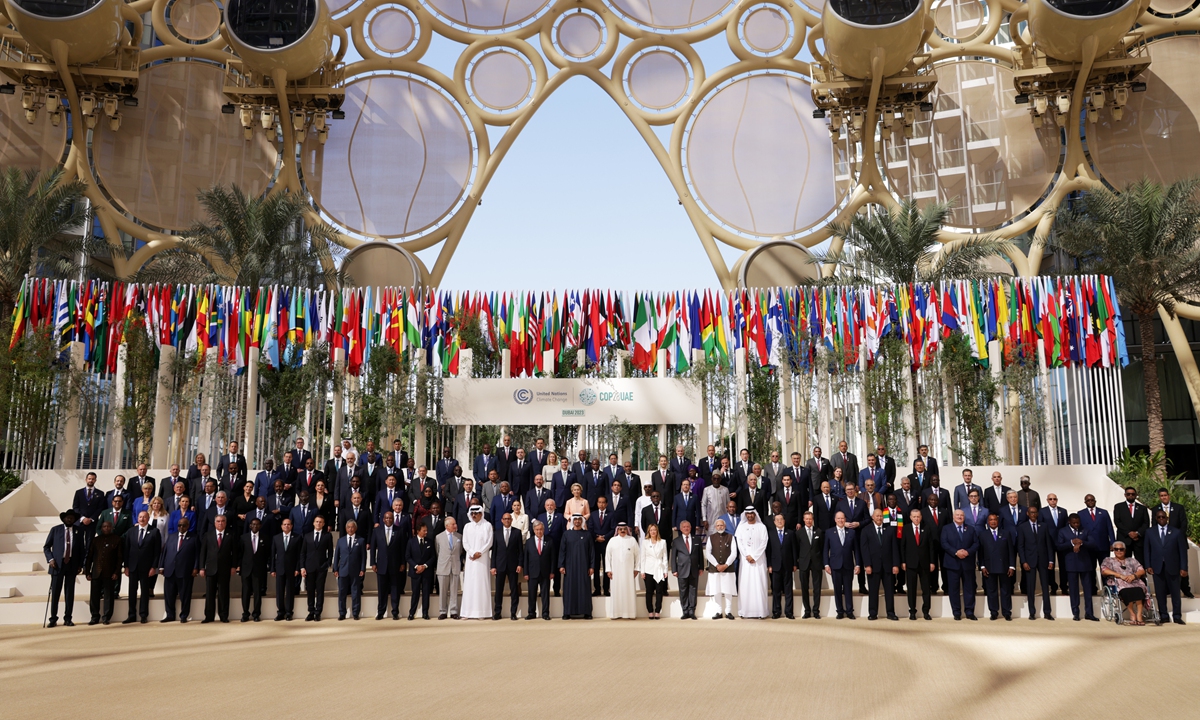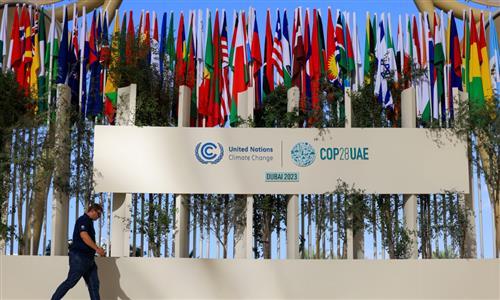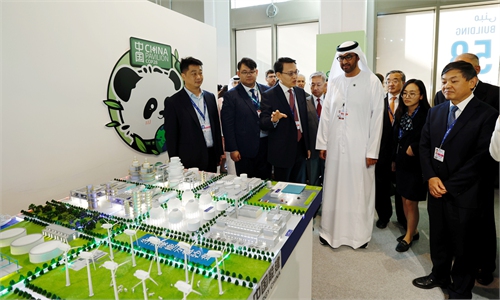Firm will, action urged to tackle global climate crisis at COP28
China welcomes newly-adopted loss and fund deal: climate envoy

World leaders pose for a group photo during the 28th session of the Conference of the Parties (COP28) to the United Nations Framework Convention on Climate Change on December 1, 2023 in Dubai, the United Arab Emirates. Over the next two days, leaders from more than 160 countries and regions are expected to outline their visions for addressing the climate crisis. Photo: VCG
World leaders from across the globe gathered in Dubai on Friday during the 28th session of the Conference of the Parties (COP28) to the United Nations Framework Convention on Climate Change (UNFCCC) to seek ways to reverse climate change.
At the opening ceremony of COP28, the previous day, delegates agreed to adopt a historic loss and damage fund deal to assist the world's most vulnerable countries in paying for the destructive impact of climate disasters.
On Friday, the second day of COP28, as leaders from various nations arrived to participate in the Climate Action Summit, the venue at Expo City Dubai buzzed with activities under tight security. Over the next two days, leaders from more than 160 countries and regions are expected to outline their visions for addressing the climate crisis.
At the high-level opening of the Global Climate Action Summit on Friday, United Nations Secretary-General António Guterres delivered an impassioned speech, calling on world leaders to act and end climate catastrophes.
"Just days ago, I was on the melting ice of Antarctica. Not long before, I was among the melting glaciers of Nepal. These two spots are far in distance, but united in crisis. Polar ice and glaciers are vanishing before our eyes, causing havoc the world over," he said.
Guterres emphasized the importance of climate justice in his speech. "But we need leadership - cooperation - and political will for action. And we need it now, " he said.
"Developing countries are being devastated by disasters they did not cause," he noted, adding that developed countries must demonstrate how they will double adaptation funding by 2025 to $40 billion per year and clarify how they will fulfill the $100 billion promise.
At the summit's opening, national leaders also expressed urgency and commitment to act to tackle climate issues.
"We work today for tomorrow, and we cooperate for the generations of the future," said Mansour bin Zayed Al Nahyan, Vice President of the UAE.
COP28 has 80,000 participants, making it the largest UN Climate Summit in history. This year, about 104,000 individuals, including technicians and security personnel, are allowed entry into the "Blue Zone" specifically designated for actual climate negotiations, as well as the pavilions of present countries and organizations.
Meanwhile, around 400,000 individuals have registered to obtain one-day passes for the expansive "Green Zone" surrounding the venue of the 2020 Dubai Expo.
A welcome start
On Thursday, the opening day of the conference, COP28 reached a consensus on the operation of a $300 million fund aimed at assisting vulnerable countries to cope with the losses and damages caused by climate change, marking a significant breakthrough on the first day of this year's climate conference.
During a side event on Friday, Xie Zhenhua, China's Special Envoy for Climate Change Affairs, welcomed the good news received at the opening of the meeting. "The issue of greatest concern to developing countries has made some progress, which is a very good thing," he said.
Xie pointed out that, in accordance with the requirements of the United Nations Framework Convention on Climate Change and the Paris Agreement, developed countries have the responsibility to provide financial and technical support to developing countries. He emphasized that while progress has been made, developed countries still need to increase their contributions to the fund and make greater efforts.
Xie also emphasized China's commitments in addressing climate change. He mentioned that to achieve China's "dual carbon" goals of peaking carbon emissions by 2030 and achieving carbon neutrality by 2060, it is estimated that approximately 136 trillion yuan ($19 trillion) will be needed. However, there is still a huge gap in technology and funding at present.
UN climate chief Simon Stiell stated that the agreement reached Thursday on the loss and damage fund has set a good start for this climate conference. Governments and negotiating representatives must capitalize on this momentum to achieve ambitious results in Dubai, he added.
Sultan al-Jaber, President of this COP28 and Minister of Industry and Advanced Technology of the UAE, announced that his country will commit $100 million in support to the fund.
A global consensus
While the climate conference represents a significant global challenge, it also involves complex disputes over interests with vast stakes at play. There are many contentions in terms of position, but overall, a global consensus is gradually being reached as the issue of climate change becomes more pressing, bringing everyone closer to a common understanding, analysts said.
On the day the fund was established, several countries announced their donations. In addition to the host country UAE, the UK committed at least $51 million, the US $17.5 million, and Japan $10 million. Subsequently, the European Union promised to provide $245.39 million, with Germany committing $100 million, Reuters reported.
Regarding the loss and damage fund, Europe has historically been relatively active in addressing climate change. Judging from the current attitude of the US, it is more active than before, but still insufficient compared to its national status, Li Zhiqing, a professor of environmental economics and Chinese economy at Fudan University, told the Global Times.
"As the US is a very capable country, but is not willing to invest the necessary costs and prices to address climate change and to bear the corresponding funds, it is not as active as other countries by comparison," he added.
Analysts urged the US and other developed countries to do more rather than put on political show.
Now, as the climate issue becomes increasingly prominent, it is clear that countries are moving more toward consensus and setting aside differences. "The collaboration and joint efforts of developed and developing countries are a major trend, so you can see so many countries and regions participating in this conference, which itself represents an attitude," Li said.
The fund already exists, but the problem still lies in how this money is used, and whether countries can really join forces in addressing the climate change issue, which is a direction that the whole world needs to work together on in the future, Bao Cunkuan, a professor from the Department of Environmental Sciences and Engineering at Fudan University, told the Global Times.




